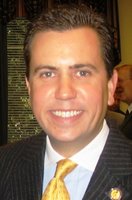
Boren: Permanent alternative minimum tax fix necessary for Oklahoma families
This week's federal income tax filing deadline serves as a reminder to every American that our tax code is far too complicated. The federal tax code alone is more than 60,000 pages long - a full third of which have been added over the past decade. But many of the frustrations encountered by taxpayers leading up to tax day could be eliminated or alleviated by fundamental reform and simplification.
Perhaps no other part of federal tax policy is in more urgent need of review than the alternative minimum tax (AMT). It was created in 1969 to prevent millionaires from using loopholes to avoid paying taxes all together. But since that time it has expanded at an alarming rate due largely to the fact that it is not tied to inflation and does not allow for many common deductions. It is now hitting families with incomes as low as $50,000.
In 2003, just over 2 million taxpayers were subject to the AMT, mostly in high-income states like New York, Connecticut and California. For 2006, 3.5 million Americans were expected to file under the AMT. Without action from Congress, 23 million taxpayers will be subject to the tax this year, 33 million in 2010 and almost 50 million by 2016.
More than 100,000 additional Oklahoma families could find themselves subject to the AMT a year from now. In 2003, only 12,000 AMT returns were filed in the state. In 2007, that number will rise to 116,000. Allowing the AMT to go unchecked will place a greater burden on taxpayers in every state, regardless of filing status.
Budget proposals recently passed by the U.S. House and Senate include temporary fixes for the AMT, one- and two-year proposals respectively. I am optimistic we will find a way to ease the burden the AMT will have on middle-class families next year. But I am concerned with this year-to-year approach. Oklahomans and all Americans deserve the peace of mind in knowing that this "stealth tax," as it is commonly called, will not burden them now or in the future.
Congressional Democrats, Republicans and the Bush administration see eye-to-eye on few things, especially when it comes to tax policy. But there is broad bipartisan support for dealing with the AMT. Fixing the problem will be expensive, but we have to come together to find a way to get it done. A one-year patch to the AMT will cost $50 billion and it is estimated full repeal could cost as much as $1.4 trillion over the next decade.
Some of the most heated debates in Congress center around tax policy. But this is a bipartisan problem that needs a bipartisan solution. President Bush has called for a freeze or repeal of the AMT, and Democratic leaders in Congress agree.
Inflation is forcing more and more taxpayers into the reach of the AMT. A permanent fix for the tax is the only way to protect middle-class families from this tax that was never intended for them in the first place. The issue must be a priority before it becomes a problem.

3 comments:
I hope he does better on this than he did for Fair Trade and the Employee Free Choice Act.
I hope he does better with this than his last votes on Fair Trade and the Employee Free Choice Act
I hope he protects working families better on this than with his votes on Fair Trade and the Employee Free Choice Act
Post a Comment